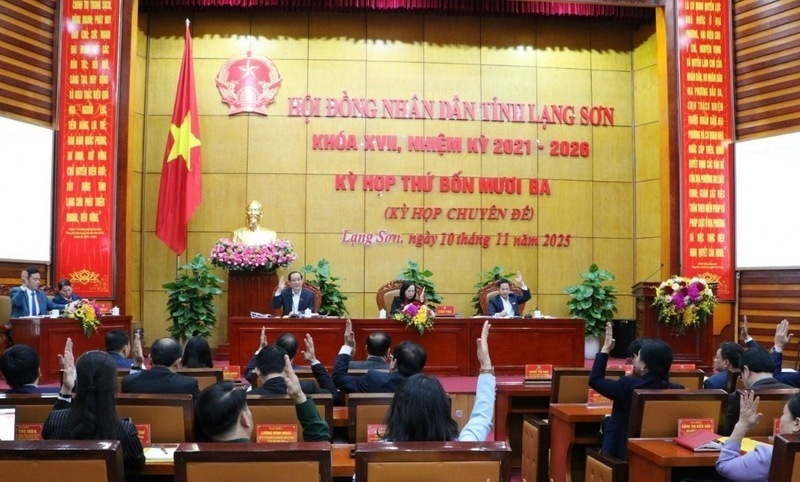On November 10, the People's Council of Lang Son province held its 43rd session (special session) to review and decide on a number of important contents to serve the socio-economic development of the province.
At the session, the Provincial People's Council conducted a personnel introduction process to elect a member of the Provincial People's Committee for the 17th term, 2021 - 2026 for Mr. Bui Quoc Khanh - Director of the Department of Industry and Trade.
After the delegates voted to elect additional members of the Provincial People's Committee for the 17th term, 2021 - 2026, the session passed a Resolution on confirming the election results of Mr. Bui Quoc Khanh as a member of the Provincial People's Committee.
In the program, specialized agencies of the Provincial People's Committee presented draft resolutions related to adjusting public investment plans and capital plans for implementing national target programs for the period 2021 - 2025 and 2025; Regulating tuition fees for public preschool and general education institutions in the 2025 - 2026 school year;
Decision on policy of converting forest use to other purposes and Regulations on the authority to decide on investment, procurement, and application of information technology using State budget capital under the management of the province.

After listening to the submissions, inspection reports and discussions, the delegates voted to approve 11 resolutions, including 1 resolution on personnel work; 3 resolutions on mechanisms and policies; 3 resolutions on public investment, budget, and conversion of forest use purposes; 4 resolutions on regulations on authority, authorization, repeal and amendment of resolutions.
Speaking at the closing session, Standing Deputy Secretary of the Provincial Party Committee, Chairwoman of the Provincial People's Council Doan Thi Hau emphasized that immediately after the session, the Provincial People's Committee, departments, branches and localities need to urgently implement the resolutions that have just been passed, specify them with specific programs and plans, put the resolutions into practice, meet the development requirements and aspirations of the people.
He also suggested that the Provincial People's Committee and relevant agencies continue to complete reports, submissions, and draft resolutions to ensure compliance with progress and regulations; carefully prepare the content to be submitted at the meeting at the end of 2025.
Regarding questioning and supervision, the Standing Committee of the Provincial People's Council agreed to select key groups of issues for questioning at the year-end meeting, including the progress of implementing public investment projects, non-budget projects, PPP projects; The effectiveness of the two-level local government model; Training human resources for established industrial parks and clusters.











